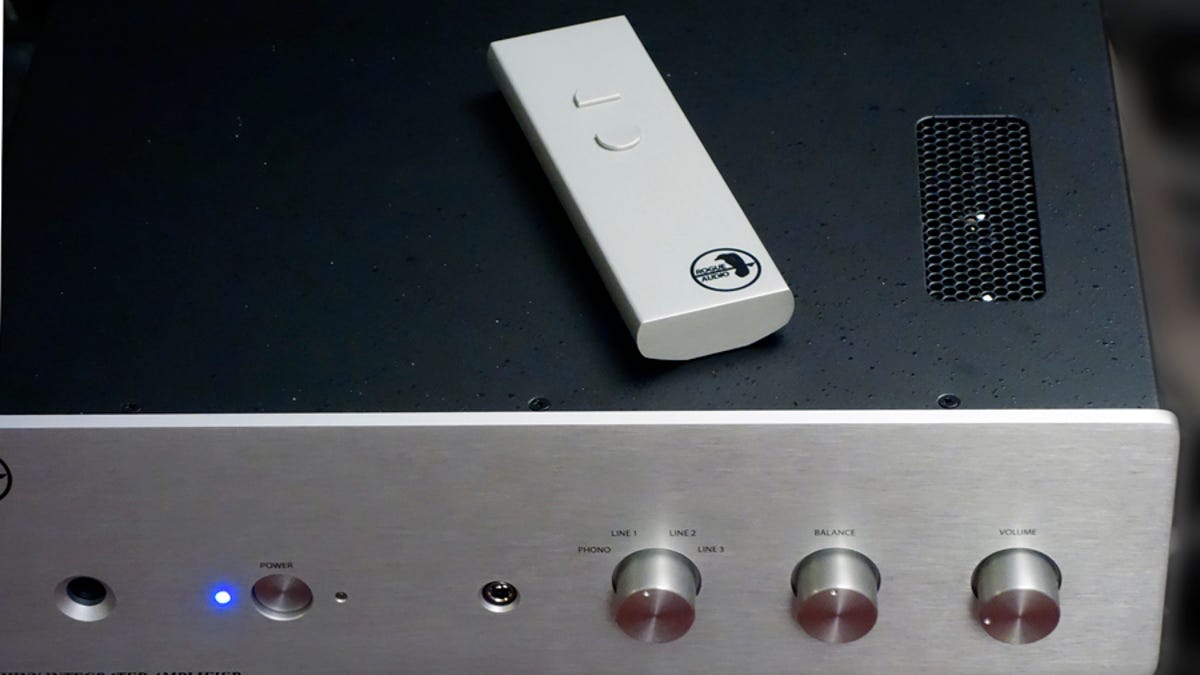 Why You Can Trust CNET
Why You Can Trust CNET Come together: Rogue amplifier fuses the best of old and new tech
Straight out of Brodheadsville, Pa. comes an amp that uses vacuum tubes and Class D technology: the Rogue Sphinx is one of the sweetest amps around.

The Rogue Audio Sphinx is a cool-running vacuum tube/Class D hybrid design, but it feels and acts like a classic 1980s high-end integrated amplifier, and that's a compliment. If you need Bluetooth or digital inputs, sorry, the Sphinx won't cut it -- check out the NAD D 3020. That NAD is wonderful, but it doesn't sound like a tube amp. The Sphinx is tonally rich and warm, it's a honey.
The Sphinx is rated at 100 watts per channel for 8 ohm speakers, 200 watts per for 4 ohm speakers. There's no way you can buy an all-tube amp that powerful for the price of a Sphinx -- it's $1,295. That's the hybrid advantage -- you get power and tube sound for a reasonable price. You won't even find an all-tube amp with a lot less power at that price with a built-in high quality phono input for your turntable and a headphone amp, but the Sphinx has those features. In addition to the phono input, there are three more stereo pairs of RCA inputs, plus fixed and variable stereo outputs; the latter can be used for a subwoofer.
Inside, the Sphinx uses a pair of 12AU7 preamplifier tubes and the power section features Hypex Class D modules. The Sphinx measures 15.5x17x5 inches and weighs 25 pounds. This cool-running amp works well with all types of speakers, including hard-to-drive Magnepans and Martin-Logans.
Rogue Audio's crew of 10 very talented people build all the amps in the company's factory in Brodheadsville, Pa. If you have a question about a Rogue amp, get on the phone and talk to the designer, Mark O'Brien. Before founding Rogue Audio in 1996, O'Brien worked for Bell Labs and other companies doing electronics development, and laser and transformer design. Rogue sells about half of its production here in the US and the other half overseas.
The Sphinx has subwoofer output jacks, so I hooked up an old PSB sub with a pair of Zu Cube speakers ($999/pair), and that combination worked perfectly. But if you're using really small speakers, talk to O'Brien and he will arrange to custom-build a Sphinx with a filter that limits the bass sent to the speakers (similar to the way bass management in AV receivers works). That sort of customer service is next to impossible to get with amps from mass market brands like NAD, Pioneer, or Rotel, but Rogue will accommodate those sort of requests for a minimal upcharge.
The sound more than lived up to my expectations. The Sphinx engages the listener and consistently brings music to life. There's more body and soul, a quick switchover to my NAD C 316BEE amp illustrated that point. The C 316BEE is still a great little amp, but the music feels more "canned" and less alive over the NAD. Maybe it's the Sphinx's tubes that add that extra something to the sound, or more likely it's the whole package -- it's a fool's game to claim that one part of a design makes it great or ordinary. I can say that partnering the Sphinx with my Zu and KEF speakers made music more fun to listen to than what I heard from the NAD and Emotiva amps I had on hand.
I loved the way the Sphinx delivered the full measure of the all-acoustic brilliance of David Grisman and Martin Taylor's "Tone Poems II" CD. Their carefully selected vintage guitars and mandolins' sounded sweet, there was no exaggerated detailing or edge. Moving onto LPs, the Sphinx' phono preamp sounded wonderful with my VPI Classic turntable, and the built-in headphone amp clicked with my Sennheiser HD 580 and Hifiman HE-400 'phones.
All in all, the Rogue Sphinx is an exceptional design, with a features set, power output, build and sound quality unbeatable in its price class. The Sphinx sells for $1,295; the optional all-metal remote control for volume adds $100 to the price.

